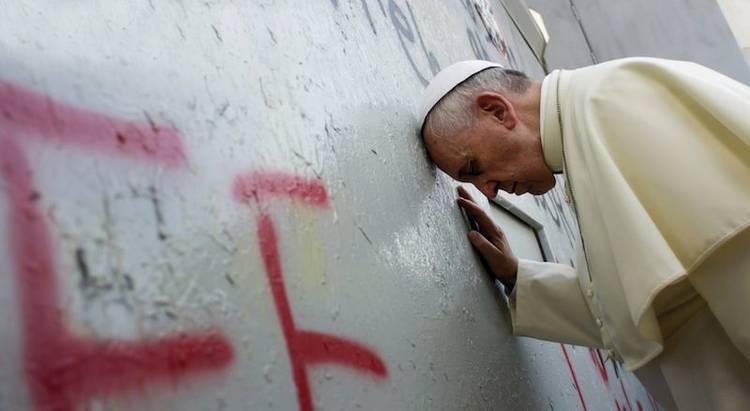


And one called Francis came. With his disarming, fascinating humility. A hitherto unknown Church came back to life—not an abstract, metaphysical, dogmatic house of Christianity but a church that embodies the real world. Francis has come here, bearing his rich symbols of poverty, to walk with people, with those who believe and those who do not.
His choice of name was the first sign of Pope Bergoglio [2]’s revolutionary papacy.
For the first time in the bimillenial history of the Church there was a Francis, a symbol of a penitent and missionary Church.
The Lord said to Francis, “Go and repair my house, which is falling into ruin.” The comparison is impossible, obviously, but Bergoglio’s courage to call himself Francis emphasized the need for the Church to change course immediately.
That is, to take the word of God to the streets of the world, just as Saint Francis [3] did. That means fighting indifference and engaging and listening to others. Which is just what Pope Bergoglio is doing. His heart goes out to the most needy, poor and far removed.
“Why I chose that name”
Bergoglio himself recounts those minutes of the conclave in which his candidacy was gaining traction. “During the election I had cardinal Claudio Hummes with me, a great friend. When the situation became a bit uncertain, he comforted me.
And when the votes rose to two thirds, there was applause, and he hugged and kissed me, saying, ‘Don’t forget the poor, the poor.’ That word entered me here.
That’s why,” Bergoglio explains, “I chose that name. I thought of Francis of Assisi as a man of peace. For me he is the man of poverty and peace, who loves and looks after creation. In this moment we don’t have a very good relationship with creation.
We have to improve that. And then I want a poor Church for the poor…” Thus in that name lies the key to understanding a papacy. We find ourselves face to face with a figure of change working to revive a community that, however withered, has deep roots. Will Francis I succeed? We’re sure of it.
Peace Crusades
In Assisi, the other Francis never grew tired, and, his miracles notwithstanding, it’s not as though the challenges he faced were any less difficult than those facing the new Pope. But he succeeded. Francis of Assisi is one of the most venerated saints in the world today.
Now, in Rome, there’s Francis. And there are many “crusades.” Just think of the difficult relationship with Islam and the requirements of peace and dialogue set out by Bergoglio, in the manner of Saint Francis, who participated in the Fifth Crusade and,in 1219, during the siege of the Egyptian city of Damietta, got permission from the papal legate to enter the Saracen camp and meet with the Sultan, the nephew of Saladin. The aim of that meeting was to find a way to put an end to the hostilities.
Eight hundred years later, Bergoglio travels to Lampedusa [4] and Jerusalem, invites Jews and Asians to pray in the Vatican, opens the gates to the East by visiting Turkey, embarks on a trip to China. Meanwhile, he warms hearts everywhere. He shows the Church which avenues to pursue, the geographic and existential peripheries. In a world without leadership, he fills up churches and squares.
He uses old words like mercy, love, truth, beauty and goodness, imbuing them with their original, unambiguous and unexploited meaning. No wonder Pope Francis has conquered the hearts of believers and non-believers. He is above all else true.
Sure, there will be plenty of obstacles and delays along the way. But the mix of Franciscan spirituality and Jesuit culture is explosive. Every sentence is as quick as a twitter post, which, Gospel in hand, nails the Catholics and questions non-believers.
Central to the Bergoglio lexicon is the word heart. Here, too, he seems to follow in Francis’ footsteps. The Pope “come from the ends of the earth” reaffirmed as much in Assisi, during his first prayer via webcam, asking Saint Francis to intercede on behalf of peace in our hearts.” He reaffirms the absolute novelty of the gospel for a society— as Bergoglio defines it—of chilled hearts.
A Great Communicator
This is a prophetic and unique leader who knows how to communicate. And not only communicate but create occasions for communicating with people every day, establish direct contact with others, involve and fascinate others with the coherence of his words and deeds, and tell the world that, above everything and everyone, people are dignified by their inalienable right to truth.
This is Francis, the Pope who left Assisi [5] for the “revolution of the Spirit” that the Church of Rome is rousing. A papacy of profound change. And things are just getting started…
Source URL: http://test.casaitaliananyu.org/magazine/focus/op-eds/article/pope-called-francis
Links
[1] http://test.casaitaliananyu.org/files/popefrancis1418863177jpg
[2] http://en.wikipedia.org/wiki/Pope_Francis
[3] http://en.wikipedia.org/wiki/Francis_of_Assisi
[4] http://en.wikipedia.org/wiki/Lampedusa
[5] http://en.wikipedia.org/wiki/Assisi